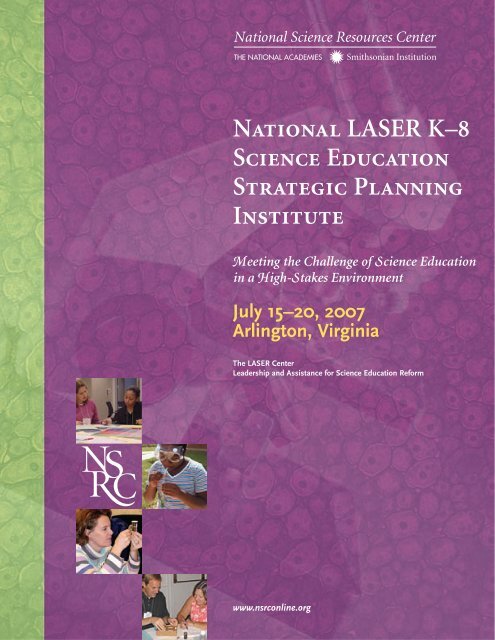National LASER K–8 Science Education Strategic Planning Institute
National LASER K–8 Science Education Strategic Planning Institute
National LASER K–8 Science Education Strategic Planning Institute
Create successful ePaper yourself
Turn your PDF publications into a flip-book with our unique Google optimized e-Paper software.
<strong>National</strong> <strong>Science</strong> Resources Center<br />
Smithsonian Institution<br />
<strong>National</strong> <strong>LASER</strong> <strong>K–8</strong><br />
<strong>Science</strong> <strong>Education</strong><br />
<strong>Strategic</strong> <strong>Planning</strong><br />
<strong>Institute</strong><br />
Meeting the Challenge of <strong>Science</strong> <strong>Education</strong><br />
in a High-Stakes Environment<br />
July 15–20, 2007<br />
Arlington, Virginia<br />
The <strong>LASER</strong> Center<br />
Leadership and Assistance for <strong>Science</strong> <strong>Education</strong> Reform<br />
www.nsrconline.org
<strong>National</strong> <strong>LASER</strong> <strong>K–8</strong> <strong>Science</strong> <strong>Education</strong><br />
<strong>Strategic</strong> <strong>Planning</strong> <strong>Institute</strong><br />
Meeting the Challenge of <strong>Science</strong> <strong>Education</strong> in a High-Stakes Environment<br />
July 15–20, 2007 Arlington, Virginia<br />
Join other forward-thinking school districts at the cutting edge of science education<br />
reform. Participate in the 2007 <strong>National</strong> <strong>LASER</strong> <strong>K–8</strong> <strong>Science</strong> <strong>Education</strong> <strong>Strategic</strong><br />
<strong>Planning</strong> <strong>Institute</strong>.<br />
This <strong>Institute</strong> will guide your school district leadership team<br />
through the rigorous process of developing a tailored strategic<br />
plan—a plan for initiating and implementing an effective researchbased<br />
science education program steeped in best practices.<br />
An effective science education program is the bridge to science<br />
literacy for all students. Research-based science learning and<br />
teaching—by promoting students’ active involvement in their own<br />
learning—help students develop and retain scientific concepts and<br />
skills, hone their critical thinking and reasoning abilities, and<br />
prepare them to be members of the future workforce.<br />
<strong>Institute</strong> Goals<br />
During this 5 1 ⁄2-day program of interactive workshops and discussions, your leadership<br />
team will:<br />
> Explore current research on how students learn and develop;<br />
> Examine exemplary research-based <strong>K–8</strong> science curricula;<br />
> Address the five elements of reform—curriculum, professional development,<br />
materials support, assessment, and administrative and community support; and<br />
> Receive technical assistance in the strategic planning process and network with others<br />
involved in science education reform.<br />
Who Should Attend<br />
A five-person leadership team of administrators, teachers, and community leaders. Team<br />
members must collectively have the skills, commitment, and credibility to lead and<br />
sustain local science education reform efforts.<br />
“We now have a common mission and vision and<br />
people with the knowledge and understanding to<br />
pass on to others. We already have a solid<br />
program, but we have now identified activities to<br />
refine and improve the program.”<br />
–A science curriculum coordinator who attended a 2006<br />
NSRC strategic planning institute
Program<br />
The institute program will focus on five critical questions that school districts must<br />
address as they plan for and implement science education reform programs.<br />
Focus Question Sessions Faculty<br />
What does a quality <strong>K–8</strong> science program look<br />
like?<br />
What research informs this way of teaching<br />
science?<br />
How do we introduce a new instructional<br />
program into our school system?<br />
How do we build an infrastructure that<br />
supports a high-quality <strong>K–8</strong> science program?<br />
How do we create a plan of action to guide<br />
and sustain future efforts?<br />
Take part in vision building and inquirybased<br />
science experiences.<br />
Expand your knowledge of research on how<br />
people learn and the impact on teaching and<br />
learning.<br />
Participate in a simulation that informs<br />
participants about how to bring change into<br />
a school system.<br />
Learn about strategies for:<br />
> Professional development;<br />
> Effective assessment;<br />
> <strong>Science</strong> materials support;<br />
> Administrative and community support;<br />
and<br />
> Selecting exemplary instructional<br />
materials.<br />
Develop a tailored strategic plan with<br />
technical assistance from experts in science<br />
education.<br />
For an example of a past program, visit http://www.laserscienceevents.si.edu/SPI/SPI_program.html.<br />
Cost<br />
$6,000 per five-person team. Discounts are available for teams who register before<br />
April 13, 2007. Participants are responsible for their transportation and lodging expenses.<br />
Registration<br />
Download and complete the online registration form on the NSRC Web site,<br />
http://www.nsrconline.org/about_the_nsrc/events.html, and return the form to the<br />
NSRC. Space is limited.<br />
Questions<br />
Contact Mary Raucci, <strong>LASER</strong> Program Associate, at 202.633.2971 or laser@si.edu, or<br />
visit http://www.nsrconline.org/about_the_nsrc/events.html.<br />
“Our school will be able to implement a more<br />
articulated and research-based program. We will<br />
be more strategic about designing staff<br />
development for science. We have seen excellent<br />
materials and know they will work in our context.”<br />
—A principal who attended a 2006<br />
NSRC strategic planning institute<br />
<strong>Institute</strong> faculty includes<br />
teachers, school administrators,<br />
scientists, engineers, and<br />
science educators. All began<br />
working for science education<br />
reform by attending an NSRC<br />
strategic planning institute.<br />
All are nationally recognized<br />
experts in science education,<br />
and all have extensive<br />
experience in science education<br />
reform.
The <strong>National</strong> <strong>Science</strong><br />
Resources Center<br />
was established by the Smithsonian<br />
Institution and the <strong>National</strong><br />
Academies to improve the learning and<br />
teaching of science for all children in the<br />
United States and throughout the world.<br />
The prestige and credibility of these two<br />
world-renowned institutions provide the<br />
NSRC with access to research, scientific<br />
expertise, and resources to inform our<br />
work, as well as an opportunity to<br />
engage and catalyze educators, business<br />
people, and scientists in all aspects of<br />
science education reform.<br />
Smithsonian<br />
Institution<br />
www.nsrconline.org<br />
<strong>National</strong> <strong>Science</strong> Resources Center<br />
Smithsonian Institution<br />
<strong>National</strong> <strong>LASER</strong> <strong>K–8</strong> <strong>Science</strong> <strong>Education</strong><br />
<strong>Strategic</strong> <strong>Planning</strong> <strong>Institute</strong><br />
901 D Street, SW, Suite 704-B<br />
Washington, DC 20024<br />
ATTN: Mary Raucci<br />
Address Service Requested


